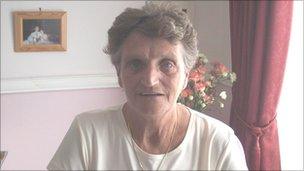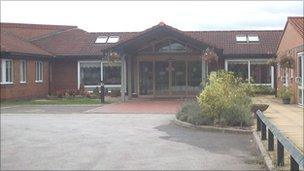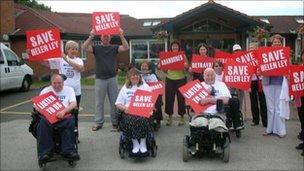Funding cut for Leamington Spa MS respite centre
- Published

Maureen Hillman said the centre gave her a warm welcome
Trustees and users of a Warwickshire respite care centre for people with multiple sclerosis (MS) are reeling at news it will close next year unless a buyer is found.
Ramon Hay is a full-time carer for his wife Mary who was diagnosed with MS, a condition affecting the nervous system, 53 years ago when she was just 19.
The couple were shocked to hear the Helen Ley Care Centre, in Leamington Spa, is threatened with closure.
Mr Hay, 77, said his wife's condition had deteriorated over the years and she could now hardly walk.
He has been greatly helped by the centre in Bericote Road, Blackdown, where his wife has gone weekly for 20 years.
"It gives me one free day to do the things I need to do," he said.
"It allows me to recharge my batteries, while knowing she is well cared for."
'Source of grief'
Mr Hay, from Coventry, believes a decision by the MS Society to withdraw funding from the centre was "uncaring".
"Helen Ley was provided by the people and I can't see how they can ride roughshod over what people think," he said.

A buyer is being sought for the 31-year-old centre
Centre users and guests protested outside the charity's headquarters about the decision last month.
The centre was the first purpose-built respite home for people with MS in Britain when it opened in 1979.
It was named after Helen Ley, who saw the need for such a centre after meeting a woman with MS who said she found it very difficult to meet anyone to talk to.
Its original founders held jumble sales and coffee mornings to raise funds for the project.
Barbara Sheppard, of the Helen Ley Charitable Trust, said many people in the area felt strongly about the centre which years of fundraising and generous donations had helped build.
She said it was gifted to the MS Society in 2005 for "safekeeping".
Another trustee, Chris Dickson, a retired GP, said the centre had "the highest standards of medical care", which included nursing staff, a physiotherapy team and room and spa therapy room.
He said it was a "source of grief" that £2.3m, raised by the trust and supporters, was spent on upgrading the centre only three years ago.
The modern centre has 24 en-suite rooms for respite care and 10 rooms for permanent residents. There are also lounge areas for social events, a serenity room and peaceful garden.
It is used by about 400 people for respite care each year.

Centre guests and carers have protested against the plans
The MS Society, which pays an annual subsidy of £2.8m to its four respite care centres, said in June it was withdrawing all funding.
It said its thorough review revealed people wanted more "personalised" care, such as receiving grants for short breaks.
It means Helen Ley will close in November 2011 unless a buyer is found.
However, the trustees believe for many people with severe MS and their carers going on holiday can be even more of a trial.
Mr Dickson said: "The bottom line is we need this facility for people with severe MS."
Mrs Sheppard added: "I feel the MS Society's decision takes away choice from a vulnerable group of people."
However, she said she was hopeful a buyer could be found and said the trustees would look forward to working with them.
'Look exhausted'
John Major, a resident at Helen Ley, said a "black cloud" descended when he heard about the policy changes.
Mr Major, 61, felt it was his only option to move to the centre 12 years ago, although he has "never regretted" the decision.
He was a management accountant when he first noticed unusual symptoms.
"My foot started dragging a bit, " he said. "Then later I remember I was working in Swindon when I went to step forward and nothing happened."
Mr Major said his health had "steadily deteriorated" over 20 years and he now needed help getting into and out of bed.
He is very worried about having to leave the centre.
"This is my home," he said. "I keeping thinking about it, it's always there.
"Here I've got a room and bathroom to myself and not all places have that."

Mr Major is worried about what his future home will be
Maureen Hillman, 67, a resident for nearly 15 years, has met hundreds of guests and believes the centre is a lifeline.
"I have seen people come for respite care and some can't speak or do anything for themselves and some of their carers look exhausted," she said.
Mrs Hillman, a mother-of-four from Dudley, first came to the centre for respite care in 1982.
"Because of family circumstances, I needed a break and after two or three days at the home I felt like I was with a different family," she said.
"It was so friendly and it was such a warm welcome and it still is."
Mrs Hillman is now looking for sheltered accommodation but said she would miss her friends and was worried about the future.
Barbara Williams, director of operations at the MS Society, said the charity's first priority was to secure alternative providers for the centres.
She said while it was aware some people with MS had been disappointed at the decision, others had welcomed it.
"Until now the MS Society has only been able to offer people one option - residential respite care," she said.
"It does not provide any comparable level of support to the people who might prefer a different sort of break or for whom our care centres are not an option because of cost, distance or the level of support required.
"The society will now support more people living with MS to have access to their choice of respite and short breaks."
She added it would include residential respite care, but not in MS Society centres.
- Published10 June 2010